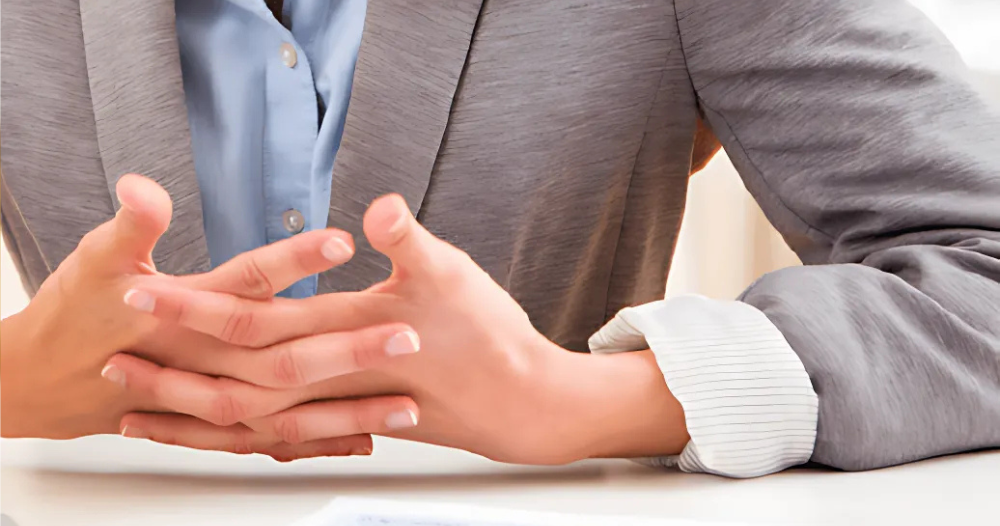Master body language during an interview with tips on posture, eye contact, gestures, and more to make a confident, positive impression and land the job.
Table of Contents
Introduction
When it comes to acing a job interview, most people focus on the usual suspects: resume, skills, and answers to questions. But did you know that your body language during an interview can have a massive impact on how you’re perceived? In fact, the way you carry yourself might just be the deciding factor between landing the job or being overlooked.
In this blog, we’ll break down the key body language cues you need to be aware of to make the best impression. Plus, we’ll share a few tips on how to read the interviewer’s body language, helping you adjust your approach in real-time. Ready to get started? Let’s dive in!
Why Body Language Matters in an Interview
Before we get into the specifics, let’s talk about why body language during an interview is so important. Interviews are more than just a Q&A session—they’re a chance to see how well you fit within a company’s culture and if you have the right attitude and energy for the role. While you’re speaking, your body language is constantly communicating messages that might be even more telling than your words.
Studies have shown that non-verbal communication makes up a huge percentage of our interactions. In fact, some experts claim that body language accounts for up to 55% of communication in face-to-face situations! This means your posture, facial expressions, gestures, and even how you sit can influence the outcome of your interview.
Key Body Language Cues to Pay Attention To

Posture: Stand Tall, Sit Right
The way you position your body in the interview speaks volumes. Good posture shows that you’re confident and open, while slouching can make you appear disinterested or unprepared. Whether you’re sitting or standing, make sure you keep your back straight, shoulders relaxed, and head held high. Think of it as showing confidence without having to say a word!
Eye Contact: Don’t Stare, Just Engage
Eye contact is one of the most powerful forms of non-verbal communication. During an interview, maintaining eye contact helps you come across as confident and engaged. It shows you’re focused on the conversation. However, don’t go overboard—staring can make you seem overly intense or even uncomfortable. Instead, maintain a natural, steady gaze and break eye contact occasionally to avoid seeming robotic.
Hand Gestures: Speak with Your Hands
While talking, it’s natural to use your hands to express yourself. Hand gestures can help you appear more enthusiastic and passionate about the position you’re interviewing for. Just be mindful not to go overboard—excessive movement can be distracting. Keep your hand gestures fluid and controlled to match your words.
Facial Expressions: Let Your Face Speak for You
Your facial expressions can convey emotions faster than words ever could. If you’re smiling during the interview, it shows you’re approachable and friendly. A genuine smile can help break the ice and set a positive tone. However, a furrowed brow or tight lips might signal frustration or discomfort. Keep your expressions relaxed and aligned with what you’re saying to appear authentic.
Avoid Nervous Habits
We’ve all had that moment when we tap our foot or fiddle with a pen while nervous. However, such nervous habits can send the wrong signal. Fidgeting can suggest that you’re anxious or lack focus. To avoid this, practice awareness and try to keep your hands still. If you do feel the urge to fidget, take a deep breath to center yourself and stay calm.
How to Read the Interviewer’s Body Language

Your own body language is crucial, but what about the interviewer’s body language? Being able to interpret their gestures can give you valuable insights into how the interview is going.
Observe Their Posture
Just like you, the interviewer’s posture can tell you whether they’re engaged or disinterested. If they’re leaning forward with their body facing you, it’s a good sign they’re interested in what you’re saying. On the other hand, if they’re leaning back with arms crossed, it could indicate discomfort or even skepticism.
Watch Their Facial Expressions
Facial expressions can be incredibly revealing. If the interviewer is nodding and smiling, it’s usually a sign that they’re enjoying the conversation and that you’re making a good impression. Conversely, if their brow is furrowed or they’re looking at their watch, it might signal boredom or impatience. These cues can help you adjust your answers or pace of speaking.
Pay Attention to Hand Movements
The interviewer’s hand movements can also give you clues about their level of engagement. If they’re gesturing while speaking, it could mean they’re fully invested in the conversation. But if their hands are folded or resting in their lap, they might be disinterested or distracted.
How to Create a Positive First Impression with Your Body Language

First impressions are everything. So, how do you use your body language to make the best one?
Firm Handshake
The moment you meet the interviewer, you’ll probably exchange handshakes. A firm handshake conveys confidence, professionalism, and respect. Don’t go overboard with an overly aggressive handshake, but ensure it’s strong enough to show you’re engaged.
Body Orientation
Your body orientation is another factor that plays a role in how you’re perceived. Try to face the interviewer directly, keeping your body fully oriented toward them. This shows that you’re paying attention and engaged in the conversation. Avoid turning your body away or slouching, as it can make you appear disengaged or untrustworthy.
Handling Nerves and Relaxing Your Body Language

Let’s be real: most of us get nervous before interviews. But here’s the thing—nervous body language can actually hurt your chances. When you’re anxious, you’re more likely to fidget or stiffen up. So, what can you do to calm yourself down?
Relaxation Techniques
Before your interview, practice deep breathing or visualization exercises to help reduce stress. A calm mind equals relaxed body language. You can also practice progressive muscle relaxation to release any tension in your body. The more relaxed you feel, the better your body language will come across.
Practice Beforehand
You don’t need to be perfect, but practicing your body language beforehand can help. Do mock interviews with a friend or in front of a mirror to get used to maintaining good posture, using hand gestures, and making eye contact. The more you practice, the more natural your body language will be in the real interview.
Common Body Language Mistakes to Avoid

We all have our habits, but some body language mistakes can sabotage an interview. Here are a few to watch out for:
Crossing Your Arms
Crossing your arms might seem like a natural way to get comfortable, but it can signal that you’re closed off or defensive. To avoid this, keep your arms relaxed and open, allowing your body language to stay inviting and approachable.
Fidgeting
As mentioned earlier, fidgeting can make you look anxious or distracted. Tapping your foot, bouncing your leg, or playing with your pen are all signs of nervousness. Instead, keep your hands still and focus on maintaining calm, deliberate movements.
Overdoing Gestures
Using hand gestures is great, but too much movement can make you seem overly excited or inauthentic. Keep your gestures subtle and only use them to emphasize key points in your conversation.
Conclusion: Mastering Body Language to Nail Your Interview
Your body language during an interview can be just as important as the words you speak. By practicing good posture, maintaining eye contact, using hand gestures naturally, and reading the interviewer’s cues, you can improve your chances of making a positive impression. Remember, it’s all about staying calm, confident, and authentic. So, before your next interview, take some time to practice these body language tips, and you’ll be ready to ace it!
For Video Content: CheckOut Our Youtube Channel
Positive Body Language Defination, Types & Use in Daily Life
FAQs
How can I improve my body language during an interview?
To improve your body language, focus on maintaining good posture, making steady eye contact, using natural hand gestures, and relaxing your facial expressions. Practicing in front of a mirror can help you feel more comfortable.
What body language mistakes should I avoid in an interview?
Avoid crossing your arms, fidgeting, slouching, and failing to make eye contact. These can make you appear defensive, nervous, or disengaged.
How important is eye contact in an interview?
Eye contact is crucial in an interview as it demonstrates confidence and engagement. Aim to maintain natural eye contact, but avoid staring, which may make you seem uncomfortable.
Should I smile during an interview?
Yes, smiling is important. A genuine smile can make you seem friendly and confident. Just ensure it feels natural and is not forced.
How can I control nervous habits like fidgeting during an interview?
To control nervous habits, practice relaxation techniques like deep breathing before your interview. Being aware of your body movements and focusing on staying still can help reduce fidgeting.
What is the role of hand gestures in an interview?
Hand gestures can make you appear more engaged and enthusiastic. Use them subtly to emphasize key points, but avoid overdoing it to prevent distraction.
How can I make a positive first impression with body language?
To make a positive first impression, give a firm handshake, maintain good posture, and face the interviewer directly. Keep your body language open to show confidence and approachability.
How do I know if the interviewer is engaged based on their body language?
Signs of engagement include leaning forward, nodding, maintaining eye contact, and smiling. These indicate that the interviewer is interested in what you’re saying.
What does crossing my arms during an interview mean?
Crossing your arms can give the impression of being defensive or closed off. To appear more open and approachable, keep your arms relaxed and avoid crossing them.
How should I sit to appear confident in an interview?
Sit up straight with your feet flat on the floor, shoulders relaxed, and avoid slouching. This conveys confidence and professionalism.
What does my posture communicate in an interview?
Good posture communicates confidence, attentiveness, and professionalism. Slouching or hunching over may suggest insecurity or disinterest.
How can I use my facial expressions to convey positivity?
Relax your face and smile when appropriate. Mirror the interviewer’s expressions subtly to build rapport and show you’re engaged in the conversation.
How can I calm my nerves and relax my body language before an interview?
Use deep breathing, visualization, or light stretching to reduce tension before the interview. A relaxed body will help you appear more at ease and confident.
What does the interviewer’s body language tell me about how I’m doing?
Positive body language, like leaning forward, nodding, or smiling, indicates interest. Negative signs, such as crossing arms or lack of eye contact, may suggest disinterest or discomfort.
How do I avoid looking closed off during an interview?
To avoid appearing closed off, refrain from crossing your arms or legs. Keep your body oriented toward the interviewer, and maintain an open, relaxed posture to appear approachable and engaged.
By: Ardansharma



Pingback: What is Listening in Body Language? - Body Language and Psychology